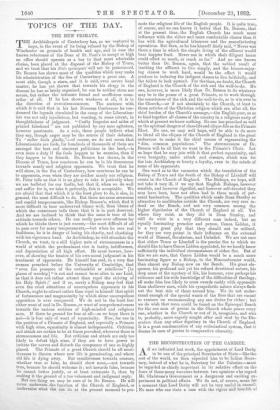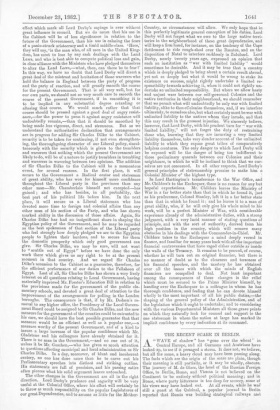THE RECONSTRUCTION OF THE CABINET.
AS we indicated last week, the appointment of Lord Derby to be one of the principal Secretaries of State—like the rest of the world, we then expected him to be Indian Secre- tary, instead of what he is, Secretary for the Colonies—must be regarded as chiefly important in its sedative effect on the fears of those many waverers between two opinions who regard Mr. Gladstone's Government as a dangerous and exciting ex- Periment in political affairs. We do not, of course, mean for a moment that Lord Derby will not be very useful in council. No man who can state a case with the vigour and breadth of effect which mark all Lord Derby's sayings is ever without great influence in council. But we do moan that his use in the Cabinet will be of less significance in relation to the future of the Government, than his use in calming the fears of a panic-struck aristocracy and a timid middle-class. Here,' they will say, 'is the man who, of all men in the United King- dom, has most to lose by any rash dealings with the Land Laws, and who is best able to compute political loss and gain, in close alliance with the Ministers who have pledged themselves to alter the Land Laws,—what, then, can there be to fear ?' In this way, we have no doubt that Lord Derby will divert a great deal of the mistrust and hesitation of those waverers who hold the balance in England between the party of progress and the party of reaction, and will greatly smooth the course for the present Government. That is all very well, but for our own parts, we should not so very much care to smooth the course of the present Government, if in smoothing it is to be implied in any substantial degree retarding or altering that course. We would much rather that that course should be pressed against a good deal of angry resist- ance,—for the power to press it against angry resistance will undoubtedly remain,—than that it should be smoothed by being made less vigorous, direct, and strenuous. But as we understand the authoritative declaration that arrangements are in progress for adding Sir Charles Mire to the Cabinet, security is to be taken for continuing, if not even strengthen- ing, the thoroughgoing character of our Liberal policy, simul- taneously with the security which is given to the tremblers and waverers that nothing which the present Government are likely to do, will be of a nature to justify tremblers in trembling and waverers in wavering between two opinions. The addition of Sir Charles Dilke to the Cabinet will be a momentous event, for several reasons. In the first place, it will secure to the Government a Radical orator and statesman of great ability, who has won for himself more confidence throughout the Liberal party in the provinces than any other man—Mr. Chamberlain himself not excepted--has gained ; and who has besides, in all probability, the best part of his political life before him. In the next place, it will secure us a Liberal statesman who has devoted more time to foreign and colonial affairs than any other man of his section of the Party, and who has shown marked ability in the discussion of those affairs. Again, Sir Charles Dilke has had no insignificant share in shaping the Egyptian policy of the Government, and he may be regarded as the best spokesman of that section of the Liberal party who feel strongly how deeply pledged we are to the Egyptian people to lighten their burdens, and to secure for them the domestic prosperity which only good government can give. Sir Charles Dilke, we may be sure, will not want to "scuttle out of Egypt" before we have done the only work there which gives us any right to be at the present moment in that country. And we regard Sir Charles Dilke's accession to the Cabinet as a guarantee, therefore, for the efficient performance of our duties to the Fellaheen of Egypt. Last of all, Sir Charles Dilke has shown a very lively interest on all questions relating to Local Government, having materially improved Mr. Forster's Education Bill in relation to the provisions made for the government of the public ele- mentary schools, and devoted a great deal of attention to the improvement of the arrangements for polling in the London boroughs. The consequence is that, if by Mr. Dodson's re- moval to any higher office, the Presidency of the Local Govern- ment Board could be assigned to Sir Charles Dilke, and the new measure for the government of the counties could be entrusted to his care, we should have the best possible guarantee that that measure would be an efficient as well as h popular one,—a measure worthy of the present Government, and of a kind to insure a large increase of the popular confidence which Mr. Gladstone and his colleagues have already obtained for it. There is no man in the Gov.ernment,—and no one out of it, unless it be Mr. Goschen,—who has given so much attention to questions affecting municipal and local administration as Sir Charles Dilke. In a day, moreover, of blunt and incoherent oratory, no one has done more than he to carve out his Parliamentary speeches into distinet and striking outline. His statements are full of precision, and his passing satire often pierces what his solid argument leaves untouched.
The other changes in the Government are all in the right direction, Lord Derby's prudence and sagacity will be very useful at the Colonial Office, where his effort will certainly be to throw as much responsibility on the popular Legislatures of our great Dependencies, and to assume as little for the Maher-
Country, as circumstances will allow. We only hope that in this perfectly legitimate general conception of his duties, Lord Derby will not forget what we owe to the large native terri- tories in the neighbourhood of these great dependencies, and will keep a firm hand, for instance, on the tendency of the Cape Settlement to ride rough-shod over the Basutos, and on the disposition of Natal to interfere recklessly in Zululand. Lord Derby, nearly twenty years ago, expressed an opinion that such an institution as "war with limited liability" would sometimes be desirable. And it may be true that a country which is deeply pledged to bring about a certain result abroad, yet not so deeply but what it would be wrong to stake its existence on success, might rightly undertake a limited re- sponsibility towards achieving it, when it could not rightly un- dertake an unlimited responsibility. But where we allow hasty and unjust wars between our self-governed Colonies and the native territories in their neighbourhood, we should remember that we permit what will undoubtedly be only war with limited liability, alike to thos eColonies themselves, and, if we interfere ultimately, to ourselves also, but what certainly must be war with unlimited liability to the natives whom they invade, and that this may result in the grossest injustice. We sincerely believe, however, that Lord Derby, with his prudent turn for "war with limited liability," will not forget the duty of restraining those who, knowing that they are incurring a very limited liability themselves, take very slender account of the unlimited liability to which they expose great tribes of comparatively helpless creatures. The only danger to which Lord Derby will be exposed will be the danger of being too indifferent to those preliminary quarrels between our Colonies and their neighbours, in which he will be inclined to think that we our- selves are not concerned. In all other respects, Lord Derby's general principles of statesmanship promise to make him a Colonial Minister o the highest type.
In Lord Hartington's transference to the War Office, and Mr. Childers's to the Exchequer, there is no reason for any but hopeful expectations. Mr. Childers leaves the Ministry of War in a far better state than that in which he found it, just as his predecessor, Colonel Stanley, left it in a far better state than that in which he found it ; and he leaves it to a man of great ability, who, if he will only give his whole mind to his work, will be a perfect Minister of War, with considerable experience already of the administrative duties, with a strong judgment, with a very lucid manner of stating questions of principle, and with the sort of authority, derived from his high position in the country, which will remove many obstacles in his dealings with the Commander-in-Chief. Mr, Childers takes to the Exchequer a mind deeply versed in finance, and familiar for many years back with all the important financial controversies that have raged either outside ar inside the walls of the Treasury. It remains to be proved, of course, whether he will turn out an original financier, but there is no manner of doubt as to the clearness and terseness of his financial speeches, and the mastery he has obtained over all the issues with which the minds of English financiers are compelled to deal. Not least important among the consequences of these changes is the relief which must be secured to the Prime Minister himself, by handing over the Exchequer to a colleague in whom he has thorough confidence, and feeling that he can devote himself wholly to the most important of all his public duties,—the shaping of the general policy of the Administration, and of the legislation which it ought to undertake; and to considering with the various Departmental Ministers all those grave points on which they naturally look for counsel and support to the one statesman in whom the nation at large has marked its implicit confidence by every indication at its command.


































 Previous page
Previous page